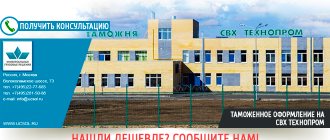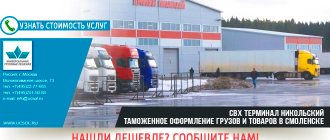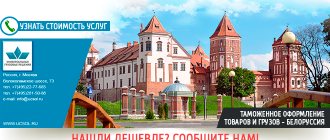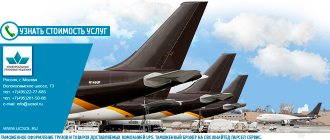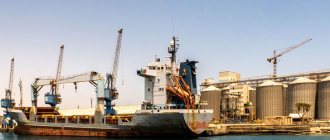HomeCustoms clearancePlaces of clearanceAutomobile temporary storage warehouses Storage warehouses Food Logistics
IMPORTANT: We help carry out prompt customs clearance of goods in a temporary storage warehouse, but our company is not a temporary storage warehouse!
The temporary storage warehouse of Food Logistics LLC is a new cargo terminal, which is located in the south of Moscow, 2 km. from the Moscow Ring Road (22 km. Kaluga highway in the village of Sosenskoye). It is located at the largest wholesale and retail food center in Russia, “Food City”. The total area of the warehouse is 4500 m², the usable area of the open area is 1400 m², the usable volume of premises is 2657.4 m³. Capacity – up to 10,000 heavy vehicles per month
The terminal has specially equipped premises, warehouses, a modern phytological laboratory, administrative buildings, control posts for fissile and radioactive materials, as well as phytosanitary and veterinary control, and areas for placing vehicles. The temporary storage warehouse is equipped with the latest warehouse equipment, control and access systems, there are refrigeration and freezer chambers that allow you to store perishable goods (vegetables, fruits, meat, dairy and fish products, etc.).
“Food Logistic” accepts and processes cargo and goods subject to phytosanitary and veterinary control.
Documents and information for customs clearance of cargo and goods at the temporary storage warehouse “Food Logistic”
- List of documents for registration of an individual at customs (View)
- List of documents for registration of a Legal entity at customs (View)
- List of documents for registration of an individual entrepreneur at customs (View)
- List of documents for customs clearance “Import” (View)
- List of documents for customs clearance “Export” (View)
- Sample payment order to ELS customs (View)
- License of temporary storage warehouse “Food Logistics” (View)
- Directions to the warehouse of Food Logistic LLC (Watch)
- Sample of filling out column 13 CMR / DTM (See)
Customs representative (broker) at Food City
Food City is the first Russian agricultural cluster, located on the outskirts of Moscow (ring road), has been operating for more than five years.
Statistics show that many cargo suppliers to FOOD CITY use the services of a customs broker, this greatly simplifies the process of cargo clearance and speeds up the process of getting products onto shelves. Please note that the customs broker only helps to collect all the necessary list of documents and will process your cargo. You do the search for a supplier or buyer yourself.
It covers an area of 91 hectares, and almost a third of fresh food in Moscow is sold there today. “Moscow has already received more than 800,000 tons of fresh food from 52 Russian regions and 26 foreign countries through Foodcity. Food safety and prices are strictly controlled, so this is a real working mechanism to ensure the city’s food security,” said Moscow Mayor Sergei Sobyanin after his visit to the cluster. As for the sellers, they cite two main advantages of Food City compared to other retail outlets. Firstly, before purchasing you can not only see, but also try the product. Secondly, the site has become an important tool for Russian processors who are implementing a policy of import substitution.
"Food City": customs post
The broker has had its own terminal for about 4 years. For declarants who need to clear customs, Food City provides this opportunity 24 hours a day. The new terminal is equipped with a modern temporary storage warehouse, through which more than 10,000 freight trucks pass per month.
It occupies more than 4,000 square meters and has the following characteristics:
- refrigeration and freezing equipment;
- the ability to track radioactive elements;
- phytosanitary inspection point;
- veterinary control;
- phytostation;
- ample parking for heavy trucks.
The post has a convenient location - just 2 kilometers from the Moscow Ring Road. The average processing time is 24 hours.
Temporary storage warehouse “FOOD LOGISTICS” at FOOD CITY
Despite a significant number of foreign contracts, most of the products sold there are of Russian origin. Food City opened its own customs terminal. This is certainly a significant development as it has accelerated the process of getting products onto store shelves and expanded opportunities for international fruit suppliers.
At the site of the temporary storage warehouse of FOOD LOGISTICS there is a Novomoskovsk customs post, where customs clearance of all cargo that arrives at FOOD CITY is carried out. All cargo is directly stored in a temporary storage warehouse during the customs clearance process.
| Working hours | 8:00-20:00 |
| Customs post code | 10013170 |
| Address | Moscow, Sosenskoye settlement, Nikolo-Khovanskoye village, building 2004 |
| Telephone | +7 (499) 682-91-52 |
| [email protected] |
“We have all the necessary monitoring systems, including for background radiation monitoring,” said Alexey Nemeryuk, head of the Moscow department of trade and services. There are also special facilities for storing and checking the quality of products in terms of some other parameters.
The temporary storage warehouse on the territory of FUL CITY is called the temporary storage warehouse “FOOD LOGISTICS” and processes tons of arriving perishable cargo every day. SWH FOOD LOGISTICS is equipped with all the necessary technologies for customs clearance of perishable imported goods. The procedure for cargo clearance is carried out strictly in accordance with the laws established by the Russian customs authorities.
Trading houses of Syria and Iran opened in Moscow
Syria, Iran, India and other countries have opened trading houses in the Food City agricultural cluster in Moscow. As God Nisanov, Chairman of the Board of Directors of the Kyiv Ploshchad Group of Companies, which owns Food City, said, there are already 26 foreign companies operating in the agricultural cluster. They sell various products, including olives, nuts, dried fruits, tea, rice, wine, cheese, seasonings, etc. Until the end of 2015, a customs terminal will begin operating at Food City, then foreigners will be able to store products for free until they will be cleared through customs. On November 11, Moscow Mayor Sergei Sobyanin visited new trading houses, a customs post and the city’s largest fresh fish market.
Foreign entrepreneurs entered the wholesale and retail market - Iran, Mexico, Syria, Tunisia, Georgia, China, India, Morocco, Turkey, Tajikistan, Uzbekistan, Azerbaijan, Armenia, etc. opened their trading houses.
“In a year, we managed to attract more than 3 thousand tenants,” says God Nisanov, chairman of the board of directors of Kievskaya Ploshchad. — These are mainly manufacturers from Russian regions (52 regions are already represented). We also have more than 26 foreign companies that have opened their representative houses. These are Latin America, Iran, Syria, Turkey, Azerbaijan, etc. We will expand further in the near future, we have free spaces for willing tenants.
Head of the Moscow Department of Trade and Services Alexey Nemeryuk noted that the Moscow authorities actively participated in attracting foreign partners.
“The city took part in the negotiations,” he says. — Trade missions of these countries and ambassadors approached us with a request to locate agricultural producers’ sites in Moscow. Many people wanted to trade here. We make presentations of the agricultural cluster abroad, foreign delegations come to us, and we see that today, thanks to this, a number of countries are represented here.
According to Nemeryuk, Food City is able to satisfy 30% of Moscow’s need for fresh food.
— The cluster will cover up to 1 million tons of fresh products. In total, Moscow consumes about 3.5 million tons,” he explained.
The Syrian Trading House offers mainly an assortment of goods for tea - several types of baklava, national sweets, tea, coffee, olives, olive oil, sesame paste. Sweets are prepared by Syrian chefs and confectioners in Moscow.
A representative of the Syrian Embassy in Russia is confident that it is beneficial for both countries to establish trade and economic relations.
“The opening of such pavilions is a good start to improving ties between Syria and Russia. Russia now needs all types of agricultural products, and Syria has a surplus of products and can present it to the Russian market, especially since we have it of very good quality. Since political relations between Syria and Russia are built at the highest level, we must also raise the level of trade and economic relations. We thank the Moscow leadership for the help they provided us to open a trading house,” said the embassy representative.
The Iran Pavilion occupies 22 thousand square meters. m, the main pride, of course, is the Persian carpets. As Iranian President Behrouz Moradi explained, the shopping arcades were opened as part of Iran’s state program for trade with Russia.
— We have handmade goods - jugs, carpets with national patterns. We also sell saffron, pistachios, dates, dried apricots, etc.,” he says. We have no problems with suppliers; many want to sell their products in Moscow.
The Indian trading house specializes in seasonings and incense, the Chinese trading house specializes in tea, the Moroccan house specializes in fruits, and the Tajikistan house specializes in sweets and dried fruits.
As Food City explained, trading houses will work with any manufacturers from their countries.
— This is a trading house, and not a store of a specific supplier. It will attract both small farmers and large producers who want to work in the Russian market, explained Food City.
During his visit to the agricultural cluster, Sergei Sobyanin noted that this format of trade is in great demand.
— A little over a year ago we launched the Food City agricultural cluster. Taking into account the experience of developing such agricultural clusters in Madrid, Paris, and Berlin, we have returned civilized wholesale and small wholesale trade for public catering, restaurants, and small shops in Moscow. And this format turned out to be extremely popular. Today, almost a third of Moscow’s fresh food products are sold through this platform,” said the mayor.
One of the main facilities is the customs terminal, which will be put into operation in mid-December.
- These are temporary storage warehouses - according to Art. 197 Federal Law “On Customs Regulation in the Russian Federation”, temporary storage is a customs procedure in which foreign goods are stored without paying taxes, customs duties, etc. That is, foreigners come and store goods on site, and during the period of storage before customs clearance they are not charged a duty is charged,” explained Food City.
The company is confident that the customs terminal at Food City will reduce the transport load in Moscow, since trucks coming to trade in the agricultural cluster will remain outside the Moscow Ring Road. The customs post will operate around the clock. Just over 100 employees will be able to service up to 10 thousand trucks per month.
As Food City said, the customs terminal is primarily intended for perishable goods, so that they reach customers as quickly as possible. The terminal has more than 4 thousand cubic meters. m of useful volume, which includes an indoor heated warehouse, a refrigerator, two freezers, a flower storage room, etc.
Previously, the largest live fish market in Moscow was opened in the agricultural cluster, which consists of 52 pools with purified water and compressors for oxygen supply, that is, conditions are created for the fish, like in an aquarium. In total, the fish cross-dock will feature 250 types of fish - live, chilled, smoked and frozen. The main suppliers are from Murmansk, Astrakhan, Crimea, Belgorod, Tunisia, Turkey, Morocco, etc.
The first Russian agrocluster “Food City” opened in early September 2014, a kilometer from the Moscow Ring Road along Kaluga Highway. The wholesale food complex is built by analogy with the best world centers, such as the French "Rangis", the Spanish "Merka", the German "Berliner Markt". The construction of the cluster was financed by Kyiv Ploshchad CJSC, owned by entrepreneurs God Nisanov and Zarakh Iliev. They also own the European shopping complex and the Radisson Royal Ukraine hotel, as well as other shopping centers in Moscow and the region.
Deadlines for cargo clearance at FOOD CITY
Registration of cargo at FOOD CITY, upon provision of all necessary documents, is carried out in three hours, however, you should be aware that the slightest error in the documentation or discrepancy in information can lead to long delays of the goods and the imposition of administrative fines.
NOTE! Many people do not know what an indicative price is and indicate the real value of their goods, after which they are refused customs clearance and the customs value is adjusted. This is explained by the fact that the cost of fruits imported into the territory of the Russian Federation must be no less than the indicative price. An indicative price is established based on the average cost of this product.
We are often contacted by entrepreneurs who purchased their goods at a price that is significantly less than the indicative price and are surprised when they find out the indicative price. We recommend that you find out the cost of your goods in advance and contact our specialists to calculate customs payments in advance.
Documents required for customs clearance at FOOD CITY
The service that our company offers has a number of features, the main feature is that for customs clearance of your goods we only need a few original documents. Other documents can be submitted in scanned form online.
Three mandatory documents for customs clearance of perishable cargo at FOOD CITY.
- Invoice
- Declaration of Conformity of technical regulations
- Phytosanitary certificate (or veterinary)
INTERESTING FACT! You can hand over all these documents directly with the cargo; there is no need to come to our office and hand over the documents. The ability to process documents remotely significantly saves your time.
Customs clearance at the temporary storage warehouse FOOD LOGISTIC
Entrepreneurs often ask the question “why do I need a customs broker?” Often, foreign trade participants decide to handle cargo clearance themselves, saving money on brokerage services. As a result, they make mistakes in the HS code and lose money due to the imposition of fines on cargo and increased customs duties.
We recommend that you use the services of a customs broker; it is the coordinated and professional work of experienced declarants and customs clearance specialists that is the secret to successful and trouble-free cargo clearance.
Registration of perishable goods at FOOD CITY
Most often, perishable goods are processed at the customs post close to FOOD CITY, often fruits and vegetables. This is due to the fact that Food City has many outlets for selling fruit. Therefore, the bulk of goods are perishable. But often entrepreneurs are not aware of the important rules for transporting and storing perishable goods. Our experts have prepared a list of important rules when transporting and processing perishable goods.
Depending on the transport used to transport perishable goods, different methods of storage and transportation are chosen. But they have the same goal - to maintain comfortable conditions for transporting cargo. After all, the better the condition of the cargo, the greater the chances of selling it at your intended price.
Filling out documentation and matching the value of the product with the indicative price is an important factor. It is worth paying attention to all the nuances when filling out, including the absence of word abbreviations.
Assigning the correct HS code. Many entrepreneurs make mistakes when specifying the code themselves. This entails a number of problems, including the seizure of cargo.
Customs clearance of vegetables and fruits
Customs clearance of vegetables and other products intended for use as food is carried out only in one case - the products are supplied from abroad and cross the border of the Russian Federation. The main difficulty with registration is the need to act as quickly as possible, since some items from the product range are perishable and require a special storage/transportation regime.
The procedure itself is the registration of goods in accordance with the submitted documentation and according to the algorithm established by the legislative framework. Customs clearance of products is inherently their legalization. It includes:
- provision of a full package of accompanying papers;
- payment of duty;
- declaration.
Customs clearance of food products is not always successful. Items from the sanctions list will not be allowed to cross the border. Therefore, foreign trade participants are recommended to first study the list of sanctions:
- countries;
- goods.
Customs clearance of products has its own specifics. Therefore, it can only be carried out at posts with specialized storage warehouses. They are equipped with refrigeration units and powerful refrigerator chambers. Thanks to this, it is possible to take into account all the subtleties of the product:
- processing level;
- shelf life;
- conditions of transportation;
- recommended storage methods;
- possible types of unloading/loading.
Any cargo requires an impressive package of documents. It may vary depending on the product category. But the standard basic list looks like this:
- nomenclature with name;
- description of all positions;
- invoice;
- certificate;
- papers for transportation;
- packing list;
- permit set.
If it is not possible to provide any documents, the cargo will not cross the border. The owner will be issued a fine and given time to correct the defect. Those who still cannot solve the problem will have to return to the starting point.
The customs clearance procedure for food products consists of several stages:
- registration as a foreign trade participant;
- determination of cargo codes;
- duty calculation;
- payment;
- preparation of papers;
- preliminary declaration;
- examination;
- two-level control (currency and phytosanitary);
- customs inspection.
As a result, the importer receives a declaration and permission to release.
But it is not always convenient for importers to deal with these issues on their own. Therefore, they shift the obligation to act on their own behalf to customs brokers.

